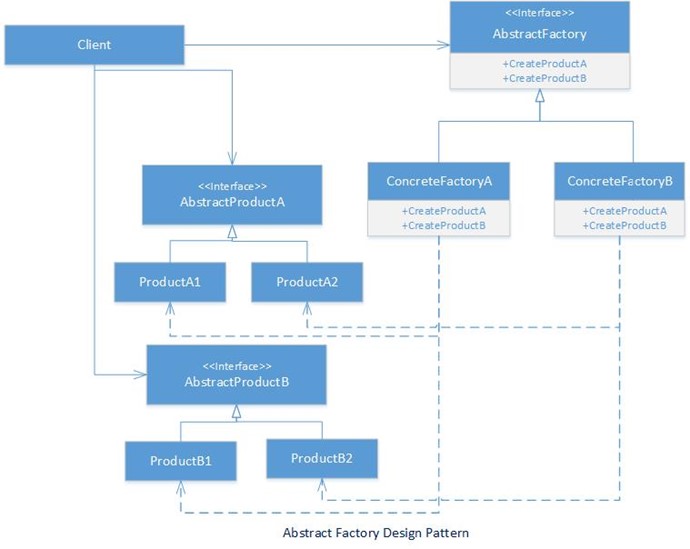How to use Abstract Factory Pattern in C#
By Tan Lee Published on Feb 16, 2024 1K
This post shows you how to use Abstract Factory pattern in C# code.
Abstract Factory pattern is like a super factory, to create other factories (create objects). This super factory is also called a factory of factories. This type of design pattern is a type of creational pattern, and is one of the best and most effective ways to create objects.
In Abstract Factory pattern, an interface is responsible for creating a factory for similar objects without specifying their class. Each factory can produce objects of different factory types (Factory Pattern).
Regular usage: Very high
UML Diagram

Classes and objects that participate in this pattern include:
- AbstractFactory: declare an interface for functions to create abstract products.
- ConcreteFactory: deploy functions from interfaces to create specific product objects.
- AbstractProduct: declares an interface for product type.
- Product: gives the product objects created by ConcreteFactory, deploy Abstract Product interface.
- Client: uses interfaces declared by AbstarctFactory and AbstractProduct classes.
Implement c# code
class AbstractFactoryPattern
{
public static void Main()
{
// Abstract factory #1
AbstractFactory factory1 = new ConcreteFactory1();
Client client1 = new Client(factory1);
client1.Run();
// Abstract factory #2
AbstractFactory factory2 = new ConcreteFactory2();
Client client2 = new Client(factory2);
client2.Run();
}
}
abstract class AbstractFactory
{
public abstract AbstractProductA CreateProductA();
public abstract AbstractProductB CreateProductB();
}
class ConcreteFactory1 : AbstractFactory
{
public override AbstractProductA CreateProductA()
{
return new ProductA1();
}
public override AbstractProductB CreateProductB()
{
return new ProductB1();
}
}
class ConcreteFactory2 : AbstractFactory
{
public override AbstractProductA CreateProductA()
{
return new ProductA2();
}
public override AbstractProductB CreateProductB()
{
return new ProductB2();
}
}
abstract class AbstractProductA
{
}
abstract class AbstractProductB
{
public abstract void Interact(AbstractProductA a);
}
class ProductA1 : AbstractProductA
{
}
class ProductB1 : AbstractProductB
{
public override void Interact(AbstractProductA a)
{
Console.WriteLine(this.GetType().Name +
" interacts with " + a.GetType().Name);
}
}
class ProductA2 : AbstractProductA
{
}
class ProductB2 : AbstractProductB
{
public override void Interact(AbstractProductA a)
{
Console.WriteLine(this.GetType().Name +
" interacts with " + a.GetType().Name);
}
}
class Client
{
private AbstractProductA _abstractProductA;
private AbstractProductB _abstractProductB;
// Constructor
public Client(AbstractFactory factory)
{
_abstractProductB = factory.CreateProductB();
_abstractProductA = factory.CreateProductA();
}
public void Run()
{
_abstractProductB.Interact(_abstractProductA);
}
}Result:
ProductB1 interacts with ProductA1 ProductB2 interacts with ProductA2
Categories
Popular Posts
10 Common Mistakes ASP.NET Developers Should Avoid
Dec 16, 2024
Simple Responsive Login Page
Nov 11, 2024





